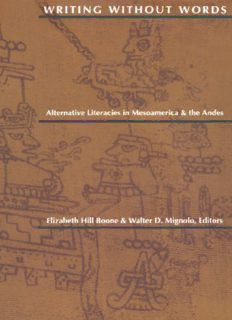
Writing Without Words: Alternative Literacies in Mesoamerica and the Andes PDF
Preview Writing Without Words: Alternative Literacies in Mesoamerica and the Andes
WRITING WITHOUT WORDS Writing without Words Alternative Literacies in Mesoamerica and the Andes Elizabeth Hill Boone and Walter D. Mignolo, Editors DUKE UNIVERSITY PRESS Durham and London 1994 © 1994 Duke University Press All rights reserved Printed in the United States of America on acid-free paper '" Typeset in Optima by Tseng Information Systems Library of Congress Cataloging-in-Publication Data Writing without words: alternative literacies in Mesoamerica and the Andes I Elizabeth Hill Boone and Walter D. Mignolo, editors. Includes bibliographical references and index. ISBN 0-8223-1377-4 (ci : acid-free paper).~ISBN 0-8223-1388-X (pa : acid-free paper) 1 . Indians~Writing. 2. Indians of Mexico~Writing. 3. Indians~Art. 4. Writing~History. I. Boone, Elizabeth Hill. II. Mignolo, Walter. E59.W9W75 1993 497~dc20 93-4531 ClP Preface and Acknowledgments vii Contents Introduction: Writing and Recording Knowledge Elizabeth Hill Boone 3 Literacy among the Pre-Columbian Maya: A Comparative Perspective Stephen Houston 27 Aztec Pictorial Histories: Records without Words Elizabeth Hill Boone 50 Voicing the Painted Image: A Suggestion for Reading the Reverse of the Codex Cospi Peter L. van der loo 77 The Text in the Body, the Body in the Text: The Embodied Sign in Mixtec Writing John Monaghan 87 Hearing the Echoes of Verbal Art in Mixtec Writing Mark B. King 102 Mexican Codices, Maps, and Lienzos as Social Contracts John M. D. Pohl 137 Primers for Memory: Cartographic Histories and Nahua Identity Dana leibsohn 1 61 Representation in the Sixteenth Century and the Colonial Image of the Inca Tom Cummins 188 Signs and Their Transmission: The Question of the Book in the New World Walter D. Mignolo 220 Object and Alphabet: Andean Indians and Documents in the Colonial Period Joanne Rappaport 271 Afterword: Writing and Recorded Knowledge in Colonial and Postcolonial Situations Walter D. Mignolo 292 Index 313 ~~Ihi, volume stems from a roundtable held on March 23-24, Preface 1991 at Dumbarton Oaks titled "Art and Writing: Record ·ng Knowledge in Pre-Columbian America." The roundtable and brought together a group of twenty-six scholars who had been think ing about and working on graphic systems of recordkeeping in the New Acknowledgments World, and it culminated a year's thought and discussion at Dumbarton Oaks about the ways Pre-Columbian societies recorded and preserved information. The meeting was intended not as a formal symposium but as an informal discussion; we wanted simply to spend a few days con sidering and talking about graphic systems of recordkeeping. To give structure to the meeting, twelve of the participants agreed to give relatively short presentations that were theoretical in nature and in tended to open up areas for general consideration. We fully intended, however, for the meat of the roundtable to be in the discussions that followed each paper. The first day, our attention was devoted to the iconic and pictorial systems of Mesoamerica: Elizabeth Boone, John Pohl, and Peter van der Loo talked about the presentatitm of time, se quence, and narrative in these systems; Mary Elizabeth Smith, Barbara Mundy, and John Monahan spoke about the graphic presentation of space and territory. Then Tom Cummins opened the question of con ventional systems such as the Andean quipu, where meaning is encoded without pictorial images; perhaps because he was alone in speaking about the Andean system or perhaps because we knew less about it, his comments sparked the greatest discussion. In the second day we turned to the hieroglyphic systems and texts of Mesoamerica. George Stuart, David Stuart, and Javier Urcid all explained the early inscriptions from La Mojarra and Monte Alban, after which Stephen Houston looked broadly at the Maya system. Walter Mignolo then carried the conver sations into the colonial period and raised the fundamental question of writing and "the book." The participants who fleshed out the discussion were Anthony Aveni, Bruce Byland, Flora Clancy, Susan Evans, Heidi Fogel, Jill Furst, Mark King, Tim Knab, James Langley, Dana Leibsohn, Carlos Rincon, Jeanette Sherbondy, Barbara Tedlock, Dennis Tedlock, Gary Urton, and David Webster. It was an intense two days of thinking and talking about issues none of us had sufficiently considered before. We all came away invigorated and stretched by it. Although this volume grew from the roundtable, it does not reiterate the presentations given there. Some of the talks addressed a specialized Mesoamerican audience and are being published in other forms else where; some of the speakers and participants were too pressed with other commitments to prepare a contribution. Too, the focus of this volume is less on hieroglyphic systems, such as those of the Maya and the Zapo tec, and more on the pictorial and conventional systems that are further from spoken language. We have added articles by Mark King and Dana Leibsohn, discussants at the meeting, as well as a contribution by Joanne Rappaport because they offer important complementary perspectives. Although Rappaport was in Italy during the roundtable, she joined the ongoing discussion of writing in postconquest Latin America upon her return. Dennis Tedlock and Gary Urton commented insightfully on an earlier version of this volume and gave us many valuable suggestions, for which we are grateful. We also thank Tedlock for pushing us to con front the issue of writing head-on and to change the title from "Records without Words" to "Writing without Words." Elizabeth H. Boone, Dumbarton Oaks Walter Mignolo, Duke University Preface and Acknowledgments viii WRITING WITHOUT WORDS
Description: